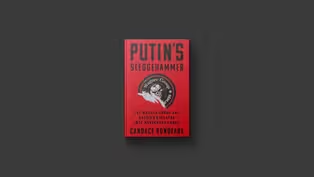
Japanese American WWII vet built bridges between cultures
Clip: 5/26/2025 | 8m 50sVideo has Closed Captions
Japanese American veteran built bridges between cultures after WWII
On this Memorial Day, we turn to the life and legacy of Yukio Kawamoto. The Japanese-American World War II veteran served his country under almost unthinkable circumstances and then spent a lifetime building bridges between the two cultures he called his own. Amna Nawaz has the story for our ongoing series, Race Matters.
Problems playing video? | Closed Captioning Feedback
Problems playing video? | Closed Captioning Feedback
Major corporate funding for the PBS News Hour is provided by BDO, BNSF, Consumer Cellular, American Cruise Lines, and Raymond James. Funding for the PBS NewsHour Weekend is provided by...

Japanese American WWII vet built bridges between cultures
Clip: 5/26/2025 | 8m 50sVideo has Closed Captions
On this Memorial Day, we turn to the life and legacy of Yukio Kawamoto. The Japanese-American World War II veteran served his country under almost unthinkable circumstances and then spent a lifetime building bridges between the two cultures he called his own. Amna Nawaz has the story for our ongoing series, Race Matters.
Problems playing video? | Closed Captioning Feedback
How to Watch PBS News Hour
PBS News Hour is available to stream on pbs.org and the free PBS App, available on iPhone, Apple TV, Android TV, Android smartphones, Amazon Fire TV, Amazon Fire Tablet, Roku, Samsung Smart TV, and Vizio.
Providing Support for PBS.org
Learn Moreabout PBS online sponsorshipLAURA BARRON-LOPEZ: On this Memorial Day, we turn to the life and legacy of Yukio Kawamoto, a Japanese American World War II veteran who served his country under almost unthinkable circumstances and then spent a lifetime building bridges between the two cultures he called his own.
Amna Nawaz has the story for our ongoing series, Race Matters.
AMNA NAWAZ: You have a treasure trope of memories.
An archive of artifacts, from ceremonial honors.
DON KAWAMOTO, Son of Yukio Kawamoto: It's not everybody gets a Gold Medal, you know?
AMNA NAWAZ: No.
AMNA NAWAZ: To symbols of service.
SHERIN FERGUSON, Daughter of Yukio Kawamoto: It's his dog tag.
AMNA NAWAZ: So this was hanging in your house growing up?
BRIAN KAWAMOTO, Son of Yukio Kawamoto: Yes.
AMNA NAWAZ: To presidential mementos.
From President Johnson to your father, as a note of appreciation.
For siblings Brian, Dawn and Sherin, the collection is a preservation and a celebration of their father, Yukio Kawamoto's life.
BRIAN KAWAMOTO: He really had an interest in saying, when people understand one another, they put their differences aside and they can see the best in one another.
And that's what became this lifelong journey.
AMNA NAWAZ: Born in Berkeley, California in 1919, Kawamoto was the son of immigrants from Hiroshima, Japan, his father a handyman and his mother a Japanese teacher.
He straddled his Japanese heritage and his all-American identity, the Boy Scout who went to Cal Berkeley to study engineering.
But during his senior year in 1941... NARRATOR: Tragic and terrible was the scene of destruction.
AMNA NAWAZ: ... a surprise Japanese attack on Pearl Harbor.
It brought war to America and suspicion and repression to Japanese Americans.
SUSAN KAMEI, University of Southern California: The sense for the Japanese American community was that this was this avalanche of hatred against them.
AMNA NAWAZ: Susan Kamei is a professor of history at USC.
SUSAN KAMEI: This message of we need to round them up, we need to get them out because we fear them, they're dangerous, they're the enemy was what was propagated throughout the United States.
AMNA NAWAZ: Within hours of the bombing, President Roosevelt invoked the Alien Enemies Act, arresting thousands of Japanese citizens in the U.S. Two months later, he signed Executive Order 9066, authorizing the forced relocation and incarceration of more than 120,000 Japanese Americans in 10 remote camps across the country.
SUSAN KAMEI: The logic was that, even though these were immigrants here in the United States that chose to have their lives be in America and their children who are American-born citizens who knew nothing else except life as a U.S. citizen would be, as a function of their race, more loyal to Japan than to the United States.
AMNA NAWAZ: Kawamoto's parents, both American citizens, were sent to the Topaz internment camp in Delta, Utah.
And Kawamoto, just two months shy of graduation and with valuable language skills, was drafted.
SHERIN FERGUSON: He didn't have any choice in the matter and that's one of the things that he said.
Shou ga nai is kind of like a Japanese saying that it is what it is.
AMNA NAWAZ: That's what he would say when you ask him about that time.
BRIAN KAWAMOTO: Yes.
He would say shou ga nai.
SHERIN FERGUSON: Yes, shou ga nai.
Can't be helped.
AMNA NAWAZ: In the Pacific, Kawamoto served his country in a military intelligence unit, translating documents and interrogating Japanese prisoners of war.
Meanwhile, back home, his own parents were imprisoned by his country.
I think a lot of people would struggle to understand how someone in that situation squares those two realities.
BRIAN KAWAMOTO: It's part cultural.
The Japanese, they don't talk a lot about those kind of bitter things, but I know he said it troubled him.
AMNA NAWAZ: A letter discovered in their father's belongings offered insight.
Kawamoto sent it to The Topaz Times from the South Pacific, saying in part -- quote -- "There are still a great many Americans who are real Americans and who think and behave according to the American creed.
We must maintain this faith to see this through."
DON KAWAMOTO: He was an American citizen, and a loyal American citizen, and so I think he felt an obligation to fight for his country.
He blamed the government, not the American people, for what happened.
AMNA NAWAZ: His children describe a modest man, even when interviewed for the Veterans History Project at the Library of Congress in 2003.
YUKIO KAWAMOTO, World War II Veteran: As far as the military part is concerned, I was no hero, but I did do my best under trying circumstances.
It was my parents in the camps.
AMNA NAWAZ: In 1945, as those camps began to close, Kawamoto moved his parents back to Berkeley after three years of detention.
Postwar life meant marriage to Sayoko Omori, whom he met in Japan, and a move for their young family across the country to Washington, D.C. BRIAN KAWAMOTO: In the early '60s, it was still a reasonable amount of racial hostility towards Japanese Americans, and that's why he moved.
AMNA NAWAZ: There, he found a new way to serve his nation, becoming the very first and the only full-time Japanese interpreter at the U.S. State Department, a former soldier now working to wage peace.
DON KAWAMOTO: You know, his lifelong goal was to smooth relationships between Japan and the United States, so I think that was a constant driving force for him in his job.
AMNA NAWAZ: The boy from Berkeley once forced to prove his patriotism years later found himself standing beside the president of the United States, and even representing the U.S. in the country his parents left behind.
His lifetime of service recognized in 2010 with a Congressional Gold Medal, the highest civilian award in the United States.
But among all the items chronicling his long life of service, one stands out, a football score from the infamous 1982 last-second game-winning Cal Berkeley play to beat rival Stanford.
ANNOUNCER: The Bears have won!
AMNA NAWAZ: Hold on.
So in your father's library, wherever this was, he's got photos of himself with presidents and dignitaries and winning photos and this photo of a football game score.
DON KAWAMOTO: It was pretty important to him.
(LAUGHTER) AMNA NAWAZ: In 2009, Kawamoto returned to campus for the graduation ceremony he was denied 67 years earlier.
In 2018, a devastating loss when cancer claimed the life of his eldest son, Craig.
The very next year, Kawamoto passed away at the age of 99.
He was buried in Arlington National Cemetery with full military honors.
Four years later, his wife was laid to rest at his side.
For decades, his family, kids and grandkids have been the keepers of Yukio Kawamoto's story.
Today, as they watch the Alien Enemies Act invoked once again, 80 years after it changed their father's life, they want more people to hear it.
BRIAN KAWAMOTO: I don't want to sound too political here, but I do see some warning signs on the horizon.
And let's face it, people of color, immigrants, whether they're here legally or not, are being deported.
So I think it's a scary time for a lot of people.
And, hopefully, the system as it was set up by our forefathers will be a sufficient check and balance so that it doesn't go too far.
AMNA NAWAZ: One of the many lessons they learned from their father.
YUKIO KAWAMOTO: I think a lot of the troubles we have in the world is through sheer ignorance.
So I think we should make every effort to understand different peoples and different cultures and develop understanding between these countries to maintain the best of relations as much as we can.
BRIAN KAWAMOTO: There's another saying called ganbatte.
And ganbatte means persevere.
And he would say that to me in a number of contexts growing up, that you need to persevere in the face of all of this adversity.
And if you have faith in your fellow Americans, hopefully the right thing will be done.
Amy Walter and Jasmine Wright on Trump's big bill
Video has Closed Captions
Clip: 5/26/2025 | 11m 12s | Amy Walter and Jasmine Wright on how Senate Republicans feel about Trump's big bill (11m 12s)
Catholic Relief Services faces uncertain future after cuts
Video has Closed Captions
Clip: 5/26/2025 | 6m 45s | Catholic Relief Services faces uncertain future after Trump cuts aid funding (6m 45s)
How young Democrats are pushing to redefine the party
Video has Closed Captions
Clip: 5/26/2025 | 3m 20s | How young Democratic candidates are pushing to redefine the party's future (3m 20s)
'Putin's Sledgehammer' reveals how Wagner Group gained power
Video has Closed Captions
Clip: 5/26/2025 | 9m 19s | 'Putin's Sledgehammer' reveals how the Wagner Group became so powerful it threatened him (9m 19s)
Russia escalates drone attacks on Ukraine
Video has Closed Captions
Clip: 5/26/2025 | 10m 2s | Russia escalates assault on Ukraine with massive drone attacks on cities (10m 2s)
Providing Support for PBS.org
Learn Moreabout PBS online sponsorship
- News and Public Affairs

FRONTLINE is investigative journalism that questions, explains and changes our world.

- News and Public Affairs

Amanpour and Company features conversations with leaders and decision makers.












Support for PBS provided by:
Major corporate funding for the PBS News Hour is provided by BDO, BNSF, Consumer Cellular, American Cruise Lines, and Raymond James. Funding for the PBS NewsHour Weekend is provided by...




